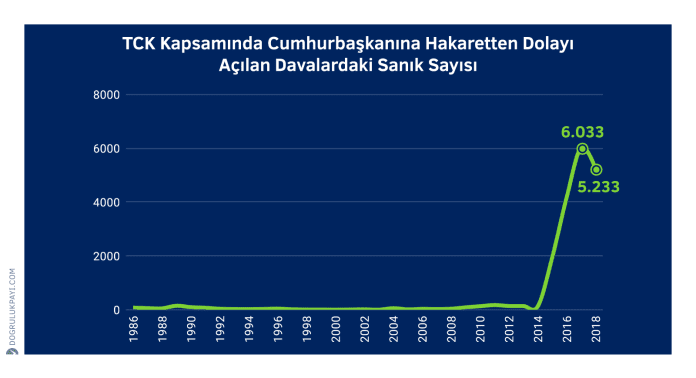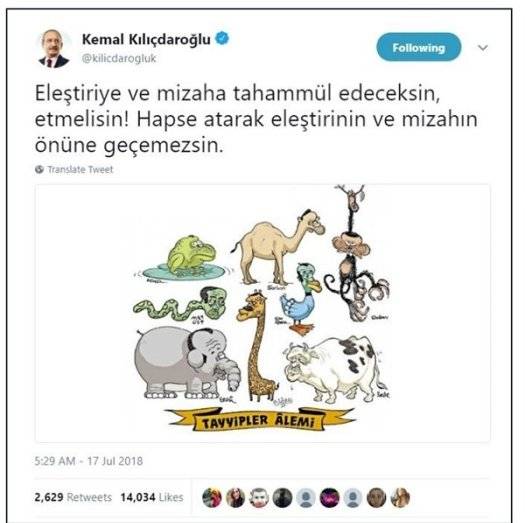“Turkey: Freedom of expression in jeopardy”. So was entitled the report-article published in March 2018, which was co-authored by Istanbul Bilgi University lecturer Yaman Akdeniz and Ankara University lecturer Kerem Altiparmak[1]. The report, the title of which is rather accurately chosen, generally evaluates the numerous recent oppressions, accusations and condemnations against journalists, students, intellectuals after the failed coup attempt on July 15, 2016. The authors indicate that the main reason to interfere the freedom of expression mentioned by the state is fighting against terrorism before the revolution attempt and mainly after it. For the considerable part of the submitted accusations and judgments the matter was Article 299 of Criminal Code of the Republic of Turkey, that is “Insulting the president”. In this analysis, we will discuss the mentioned Article about the restriction of freedom of expression and will particularly talk about the increase in numbers of court cases opened on this basis during Recep Tayyip Erdoğan’s leadership.
The freedom of expression and Turkey
Turkey has always been one of the most restrictive countries concerning media freedom and freedom of expression in the Council of Europe. Of a total of 20657 judgements issued by the European Court of Human Rights (ECHR) between 1959 and 2017, Turkey was involved in 3386 judgements as a respondent ranking first in the list of all the member states. Of a total of 700 judgements in which the ECHR has found a violation according to Article 10 of European Convention on Human Rights, Turkey ranks the first with 281 verdicts[2].
Perhaps the fourth estate relates to restriction of freedom of speech the most. In recent years Turkey has not left the top of the list of countries with most journalists arrested. According to the January 4, 2020 report of “The Economist”, Turkey is the second in this list conceding only China until December 1, 2019. While “The Economist” talks about 47 imprisoned journalists, the Independent journalists’ association (Özgür Gazeteciler İnisiyatifi) mentions 130 journalists and Turkey’s Trade Union talks about 108 [3]. Especially after 2016, Turkey has gained the reputation of so-called ‘’unsafe’’ country for journalists. By “To be a member of a terrorist organization”, “Canceling accreditation”, “Insulting the president” and matters like these have lately been the causes that many representers of foreign media working in Turkey were imprisoned and exiled [4].
Turkish government’s persistent control over the media has also been proceeded under the Justice and Development Party’s power. Perhaps alongside with many such incidents (when the authoritative media didn’t allow the coverage of undesired cases), the most vivid one was the demonstration of a film about penguins by the prominent CNN Türk during the critical moment of repressions on protestants and citizens at 2013 Gezi park protests. European Commissioner Štefan Füle called such attitude towards the protests ‘‘deafening silence of Turkish media.’’[5]
In Turkey, along with the penetration of the Internet, the Internet censorship and the blocking of sites were spread by the Committee on Information and Communication Technology (Bilgi Teknolojileri ve İletişim Kurumu), the Government, the Department of Telecommunication, Postal services adjacent to the latter (Telekomünikasyon İletişim Başkanlığı) and the courts during the last decade. Youtube, Twitter, Vimeo and MySpace have been blocked for many times since 2008. And only on January 15, 2020 the ban on Wikipedia, which has been in place since April 2017, was lifted.
“Insulting the president” in Turkish Criminal Code
The Article 299 of 5327 Criminal Code, accepted by Ahmet Necdet Sezer ruling in the 2005s, has the epigram “Insulting the president” (Cumhurbaşkanına hakaret). The epigram consists of the following points
- One is sentenced to imprisonment for 1-4 years if he or she insulted the President of the Republic.
2. If the offence was committed in public, the penalty strictens to 1/6 extent.
3. In order to initiate criminal prosecution connected to this offence, the permission of the Minister of Justice is needed [6].
The effective remedies for the president have very deep roots. In Ancient Rome, the emperors considered any offence against them to be an offence against the country by uniting with the country for abolishing the tendencies of republican order [7]. In essence, Article 299 continues existing as a remnant of the imperial leadership. And the fact, that the Article 299 is regulated under the “Offences against the Symbols of the State Sovereignty and the Reputation of Institutions” (Devletin Egemenlik Alametlerine ve Organlarının Saygılığına Karşı Suçlar) and not next to the Article under the title of “Offences against dignity” (Șerefe karşi suçlar) in the “Insult” (Hakaret) of the 125th chapter, says that the legislator considered Insulting the President in the Penal Code as a crime against the State.
And there is a question. What can be considered an insult according to this Article? Can the words “thief” and “tyrant” with which, by the way, a lot of judicial cases are open, really be estimated as insults against the president and not be a strict criticism against the government and its president?
In the declaration on Freedom of political debates in media, adopted by the Committee of Ministers of the Council of Europe on February 12, 2004, it is stressed that the criticism of the political officials, the state leaders and politicians is one of the most important preconditions in democracy.[8] This document completely corresponds the approach of ECHR to this article. Particularly, by ECHR’s decision about Pakdemirli/Turkey in 2005, ECHR’s motive of demonstrating journalist Bekir Coşkun’s insult to the president as a way of expressing freedom of expression in 2015 can be seen. And on October 14, 2016, in the report 858/2016 of the Venice Commission the following is said; ”Due to its excessive use, Article 229 (Insulting the President of the Republic) should be completely repealed.”
After the publication of the above-mentioned report of the Venice Commission, impetuous discussions heated in Turkey. In 2016, on this background, the Minister of Justice of Turkey, Bekir Bozdağ said the following in his speech; “At present, there are 47 member states in the Council of Europe. The phrase ‘Insulting the President of the Republic is considered an offence’ exists almost in all the states”. In other words, the existence of Article 299 and the restrictions of freedom of expression were justified by referring to the presence of the Article in other European states. However we have to observe that changes are happening in European states concerning this Article. And the usage of this Article is rare in the mentioned states. But in Turkey, the frequent usage of this Article is remarkable.
Recep Tayyip Erdoğan as the leader who has used Article 299 the most
During 1986-2018, 13889 suspects were charged by Article 299. During the rule of the 7th President of the Republic Kenan Evren, the number of accusations was 340, 207 – under the rule of Turgut Özal, 158 – under Süleyman Demirel’s leadership, 163 – in case of Ahmet Necdet Sezer’s leadership. During the period of Abdullah Gül’s leadership the amount increased by 420% and reached 848 accusations.

At least it’s clear from the diagram that Erdoğan is the Turkish leader who has used the Article the most. By this Article, the amount of accusations exceeded the previous one by 19.5 times forming 17406 cases during the first years of Erdoğan’s leadership[12]. Many deputies, journalists, cartoonists, artists and ordinary citizens appeared in the defendant’s chair for insulting Erdoğan. The reason for the accusations are public speeches, humorous posts on social networks, caricatures concerning Erdoğan. By the Article 299, the leader of Turkey’s Nationalist Movement Party (MHP) Devlet Bahçeli, Selahattin and Figen Yüksekdağ Demirtaş, former co-chairs of the People’s Democratic Party (HDP), HDP deputy Ahmet Yıldırım, Armenian Member of the Turkish Parliament Garo Paylan, and other political figures were charged. In this regard, the amount of judgment cases on Kemal Kılıçdaroğlu, the leader of the CHP or “Republican People’s Party” was record-breaking. Kemal Kılıçdaroğlu t has become the figure who most often appeared in the defendant’s chair during the whole history of court cases on the grounds of insulting Erdogan and paid most compensation to him. Only in the last 8 years, 15 judgements were made against Kılıçdaroğlu, and he was compelled to pay 1 million Lira compensation to Erdoğan[13].On July 17, 2018, Erdogan filed a lawsuit against Kılıçdaroğlu and other 72 deputies from his party for publishing a famous caricature “Kingdom of Tayyip’s” on Twitter[14]. Adjacent to the caricature, Kılıçdaroğlu wrote “You can’t avoid criticism and humour by jailing people. You have to tolerate it!”

It should be reminded that yet on March 11, 2016, Karşıyaka 7th Criminal Court of First Instance and the Istanbul’s 43rd criminal court of the first instance on March 26 applied to the Constitutional Court of Turkey asking for the annulment of the article 299 on grounds of its unconstitutionality, claiming that the article was against Articles 2 (the characteristics of the Republic), 10 (Equality before the law) and Article 39 (Right to prove an allegation) of the Constitution. The Constitutional Court examined the application and rejected it on December 14, 2016. According to the Constitutional Court, the President is the united representative of the Turkish state, and Turkish people and words uttered against the President’s person should also be regarded among offences committed against the State[15].
However we must take into consideration the circumstance that Erdoğan is simultaneously the president of the ruling Justice and Development Party, its first face and symbol, the main figure representing this political force in the elections and campaigns (so was during Turkish local elections in 2019). Therefore, being protected by the above-mentioned special law as a president can, in fact, become a circumstance that constrains the opposition and creates unequal conditions.
In our opinion, the invalidation of the article in the coming years is more than unrealistic, because as we have already seen, President Erdoğan is the Turkish politician who has used the article the most (which, of course, also has a psychological component) and Kılıçdaroğlu’s appeals to tolerate criticism have been in vain.
In conclusion, it should be stated, Turkey is one of the most prominent countries in the world in terms of restrictions on freedom of expression, information control and censorship. By the example of Article 299 of the Turkish Constitution, we intended to show that the authorities accept any criticism with great difficulty, and try to silence dissidence. This analysis allows to conclude that the present president of Turkey Recep Tayyip Erdoğan is the leader who subjects the statements against him to censorship and is protected judicially the most. While a lot of intellectuals, lawyers, ordinary citizens and international Human Rights organizations realize the necessity of fighting against the Article 299, no way of fighting against the usage of the Article has been effective yet.
Bibliography
- Վահրամ Տեր-Մաթևոսյան/ «Զանգվածային լրատվամիջոցները Թուրքիայում. քաղաքականություն, սահմանափակումներ և մարտահրավերներ»/ Արևելագիտության հարցեր 10-րդ հատոր/ ԵՊՀ/ 2015/ Էջ 97-137
- Yaman Akdeniz, Kerem Altıparmak/ “Turkey: freedom of expression in jeopardy”/ PEN International/ 2018 /p. 4
- Türk Ceza kanunu/5237 sayılı/2004/ 299. Madde
- Özge Demir/ “Uygulamada Cumhurbaşkanına hakaret suçu ve ilgili mevzuat”/ 2017
- Fatma Sümer/ “Ifade Özgürlüğü Ve İtibarın Arasında Cumhurbaşkanına Hakaret Suçu”/ SETA Analiz/ 2018/ sayı 229
- Özge Demir/ “Yeni Rejimde Cumhurbaşkanına Hakaret Suçuna Yönelik Eleştirel Bir İnceleme”/ Hakemli Makale/ Suç ve Ceza 2018/ sayı 3
- “Medyada siyasi tartışma Özgürlüğü bildirisi”/ Avrupa Konseyi Bakanlar Komitesi/2004/ Türkçe çevri
- Venedik Komisyonu’nun 14/10/16 tarihli ve 858/2016 sayılı rapor
- Yaman Akdeniz, Kerem Altıparmak/ “Turkey: freedom of expression in jeopardy”/ PEN International/ 2018
Internet links and media articles
- https://www.dogrulukpayi.com/bulten/cumhurbaskanina-hakaret-kanunu
- https://www.google.com/amp/s/barandogan.av.tr/blog/ceza-hukuku/cumhurbaskanina-hakaret-sucu-cezasi-nedir.html
- https://www.google.com/amp/s/amp.dw.com/tr/cumhurba%25C5%259Fkan%25C4%25B1na-hakaret-davalar%25C4%25B1nda-rekor-art%25C4%25B1%25C5%259F/a-46622702
- https://m.dw.com/tr/aym-cumhurba%C5%9Fkan%C4%B1na-hakeret-su%C3%A7unun-iptalini-reddetti/a-36768090
- https://m.dw.com/tr/erdo%C4%9Fana-hakaret-su%C3%A7undan-3658-ki%C5%9Fiye-dava/a-39476792
- https://m.dw.com/tr/tutuklu-gazeteci-say%C4%B1s%C4%B1nda-t%C3%BCrkiye-%C3%BC%C3%A7%C3%BCnc%C3%BC-s%C4%B1rada/a-46780288
- https://m.dw.com/tr/cpj-en-fazla-tutuklu-gazeteci-t%C3%BCrkiyede/a-46714898
- https://m.dw.com/tr/erdo%C4%9Fana-hakaret-davalar%C4%B1-2-bine-yakla%C5%9Ft%C4%B1/a-19089106
- https://m.bianet.org/bianet/ifade-ozgurlugu/209331-kac-kisi-cumhurbaskanina-hakaretten-cezaevinde
- https://www.evrensel.net/amp/312490/cumhurbaskanina-hakaret-davalari-raporlastirildi
- https://m.dw.com/tr/birg%C3%BCn-yazar%C4%B1na-dava-i%C3%A7inde-davadan-hapis-cezas%C4%B1/a-50396819
- https://m.dw.com/tr/eski-alman-vekile-erdo%C4%9Fana-hakaretten-dava/a-50365790
- https://m.dw.com/tr/b%C3%B6hmermann%C4%B1n-erdo%C4%9Fan-%C5%9Fiiri-hakk%C4%B1nda-yeni-mahkeme-karar%C4%B1/a-49837232
- https://m.dw.com/tr/canan-kaftanc%C4%B1o%C4%9Flu-yeniden-h%C3%A2kim-kar%C5%9F%C4%B1s%C4%B1nda/a-50322512
- https://m.dw.com/tr/yeni-t%C3%BCrkiyenin-ilk-se%C3%A7imleri-cumhurba%C5%9Fkan%C4%B1-muhalefete-kar%C5%9F%C4%B1/a-47934214
- https://m.dw.com/tr/gazeteci-h%C3%BCsn%C3%BC-mahalli-tutukland%C4%B1/a-36788359
- https://m.dw.com/tr/t%C3%BCrkiyede-31-mart-%C3%B6ncesi-medyan%C4%B1n-ba%C4%9F%C4%B1ms%C4%B1zl%C4%B1%C4%9F%C4%B1-tart%C4%B1%C5%9Fmas%C4%B1/a-47825457
- https://m.dw.com/tr/t%C3%BCrkiye-gazeteciler-i%C3%A7in-korku-%C3%BClkesi-oldu/a-1921443
- https://www.takvim.com.tr/guncel/2018/07/18/baskan-erdogan-kilicdaroglu-ve-72-chpli-vekil-hakkinda-suc-duyurusunda-bulundu
- https://m.irazek.am/hy/news/6728
- https://orbeli.am/hy/post/96/2019-01-09/%D4%BB%D5%9E%D5%B6%D5%B9+%D5%A1%D6%80%D5%AA%D5%A5+%D5%B4%D5%A5%D5%AF+%C2%AB%D5%A2%D5%BC%D5%B6%D5%A1%D5%BA%D5%A5%D5%BF%D5%A8%C2%BB
- Caricature link https://www.google.com/search?q=tayyipler+alemi++kilicdaroglu+Takvim&tbm=isch&ved=2ahUKEwiItLbNg9HoAhXOXZoKHc2aBEsQ2-cCegQIABAA&oq=tayyipler+alemi++kilicdaroglu+Takvim&gs_lcp=CgNpbWcQA1CSuwZY8cwGYPfOBmgAcAB4AYAB3QGIAakIkgEFMS40LjKYAQCgAQGqAQtnd3Mtd2l6LWltZw&sclient=img&ei=UqyJXojDHc676QTNtZLYBA&bih=657&biw=1366#imgrc=Qs39ZhTrEv24vM
References
[1]“Türkiyede ifade özgürlüğü can çekişiyor”/DW Türkçe/ Burcu Karakaş/ 28.03.18https://www.dw.com/tr/pen-raporu-t%C3%BCrkiyede-ifade-%C3%B6zg%C3%BCrl%C3%BC%C4%9F%C3%BC-can-%C3%A7eki%C5%9Fiyor/a-43173904
[2] Yaman Akdeniz, Kerem Altıparmak/ “Turkey: freedom of expression in jeopardy”/ PEN International/ 2018 /p. 4
[3]The Economist: Tutuklu gazeteci sayısında Türkiye ikinci/ Gazete Duvar/04.01.2020 https://www.gazeteduvar.com.tr/gundem/2020/01/04/the-economist-tutuklu-gazeteci-sayisinda-turkiye-ikinci/
[4] Tükiye gazeteciler için korku ülkesi oldu/DW Turkçe/Aram Ekin Duran/ 26.04.2016
[5] See speech by Commissioner Š.Füle during the ”Speak-ap!2: Loud wake up call for improving media freedom in Western Balkans and Turkey” conference
https://ec.europa.eu/commission/presscorner/detail/en/SPEECH_13_558
[6] Türk Ceza kanunu/5237 sayılı/2004/ 299. Madde.
[7]Özge Demir/”Yeni rejimde Cumhurbaşkanına hakaret suçuna yönelik bir incelem”/ Hakemli makale/ 2018/s. 54
[8]“Medyada siyasi tartışma Özgürlüğü bildirisi”/ Avrupa Konseyi Bakanlar Komitesi/2004/ Türkçe çevri
http://www.hsk.gov.tr/Eklentiler/Dosyalar/f20fbc23-8676-4066-9213-3f0b00798adf.pdf.
[9]Ankara Mahkemesi, Bekir Coşkun Bireysel Başvuru Kararı, No:2014/12151, Karar Tarihi:04/06/2015
[10] Venedik Komisyonu’nun 14/10/16 tarihli ve 858/2016 sayılı rapor için bkz.
[11]“Cumhurbaşkanına hakaretten kaç kişi sanık oldu?”/Doğruluk Payı/Emincan Yüksel/22.01.2019
https://www.dogrulukpayi.com/bulten/2018-yilinda-cumhurbaskanina-hakaretten-kac-kisi-sanik-oldu
[12] Ibid.
[13]«Ի՞նչ արժե մեկ բռնապետը»/Օրբելի վերլուծական կենտրոն/ Նարինե Թադևոսյան/2019-01-09
[14]“Başkan Erdoğan , Kılıçdaroğlu ve 72 CHP-‘li vekil hakkında suç duyurusunda bulundu”/ Takvim gazetesi/18.07.2018
[15]«Ի՞նչ արժե մեկ բռնապետը»/Օրբելի վերլուծական կենտրոն/ Նարինե Թադևոսյան/2019-01-09
Author: Anahit Karapetyan © All rights reserved.
Translator: Jemma Khachatryan









